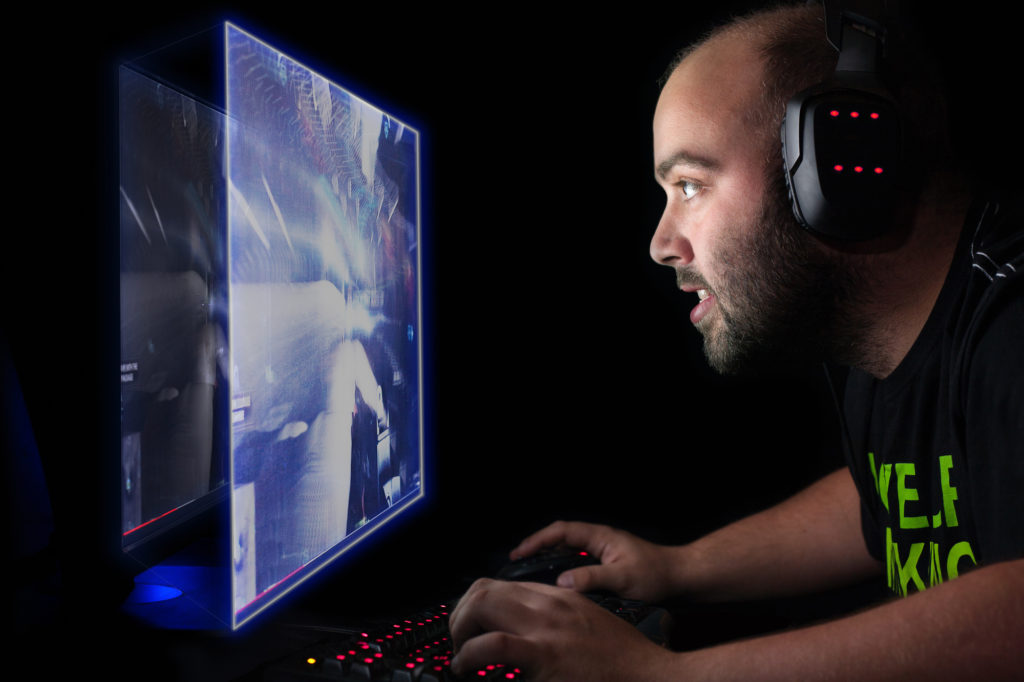
Consoles are fun, but serious gamers know that nothing beats PC games when it comes to performance and variety. But when it comes to getting your hands on your first PC, you might wonder what you should look for.
If you’re shopping for a new PC, and especially your first gaming PC, make sure to check out these key features below!
1) Graphics Card
What sets PCs apart from consoles is the ability to pick and choose your hardware. No piece of hardware is more important for a gaming PC than its graphics card. Depending on your budget, your graphics card might be the most expensive bit of equipment in your new gaming PC. It’s all worth it!
If you seek to experience the absolute best in terms of visual performance, your CPU, your memory, and even your display screen won’t do a thing if your graphics card is slow.
There are lots of things to consider when picking a graphics cards. The main features to check are:
- Core clock
- Memory clock
- GPU memory
- Shader units
- Coolers
- SLI/Rapidfire Configuration
SLI, standing for scalable link interface, refers to the ability to use multiple graphics card in one PC. Professional gamers link together two, and even three powerful graphics cards together. If you are serious about 4K gaming with all settings maxed out, when SLI might be the way to go. Keep in mind that two GEFORCE GTX 1080 Ti in SLI may set you back by 1,500 dollars or more.
2) Memory
Memory has always been an essential aspect of gaming computers. Even though your GPU will have its own dedicated graphics memory, it is important to have a generous amount of RAM to support your operating system and background tasks.
It’s a good idea to have at least 8GB of DDR3 RAM as this is what most modern games recommend. 4GB is the bare minimum if you’re on a budget, but it’s best to have more than less memory. Windows 10 updates require substantial memory, and newer games sport higher minimum requirements. So, the more memory you have, the slower your PC will get obsolete.
3) SSD Storage Drives
You can never have too much disk space. Even though individual games don’t take up a lot of storage space, your collection will only grow in time. 500GB is disk space might seem like a lot today, but that is the equivalent of 30 modern games installed.
If you want your gaming PC to hold multiple games, be sure to invest in a large drive. However, the larger the storage, the slower it becomes. Here is where SSD comes in.
With solid-state drivers, you get speed and reliability. Most good gaming computers feature an SSD for the operating system and all system programs. This gives the PC faster loading times. If you can afford it, you can install your PC games on SSD disks for near-zero loading times and optimal performance.
4) Display Screen
While some argue that a display screen is just a peripheral, you can’t live without it. You need good screen resolutions to enjoy the most visually demanding games.
Moreover, without a proper 120Hz display screen, you’ll be wasting money on your graphics card. If your display screen can’t handle the input from your graphics card, then there is no use in buying a good one!
When shopping for a good monitor for your gaming PC, check out these parameters:
- Maximum resolution
- Refresh rate
- Contrast ratio
- HDMI, DVI and DisplayPort support
Aim for a 1920×1080 at a minimum as this will give you access to some of the highest gaming settings. If you can afford it, a 2560×1440 will get you to the top.
5) Processor
A dependable CPU processor will boost your gaming experience. Even though it’s not as important as a good graphics card, a CPU will help you with loading times and background tasks.
Today, more and more games are built around quad-core processors. Even though almost no games support hex-core processors today, this will change in the future.
If it’s within your budget, invest on an Intel Core i7 or AMD Phenom II CPU. Anything more might be an overkill for the next few years.
6) Motherboard
Your motherboard is where everything connects. The CPU rests in the heart of your motherboard, and all other hardware mentioned above goes on it.
When shopping for a motherboard, there are many sizes to choose from. Your primary consideration here should be durability, as the lifespan of a motherboard is pretty much the lifespan of your gaming PC.
7) Case, Power, and Ventilation
PC cases can be flashy, but the main features to look for here are PSU output and proper ventilation. Good gaming PCs generate a lot of heat, and you need strong coolers to keep playing at max settings.
Similarly, your PSU should be reliable enough to feed your graphics card and all those flashy LEDs on the case.
Are you looking for a custom, solution for hassle-free PC gaming? Check out BLD, the experts in bespoke gaming PC solutions, to learn more about custom-built PCs. With BLD, you can get the right PC for you, and gain access to tweaks and upgrades at prices you’ll love!
8) Peripherals
Gaming peripherals are essential for some gamers. If you are on a budget, you can skip professional keyboards and mice in favor of generic ones with minimal impact.
However, if you wish to experience PC gaming at its best, professional gaming peripherals will supercharge your games. In addition to a mouse and a keyboard, you can get joysticks, gamepads, dance pads and other insane peripherals that open up new gaming dimensions.
Finally, don’t forget a good pair of speakers and headphones, especially if you’re planning to enjoy player versus player games.
Serious About PC Gaming? Check Out Our Desktop Gaming Section!
Now that you know what it takes to have a great gaming PC, it’s time to start browsing for games.
From PC-only exclusives to games with unbeatable PC performance, check out our blog. With decades of collective experience and a passion for video games, we’re one of the world’s premier game news sites!

